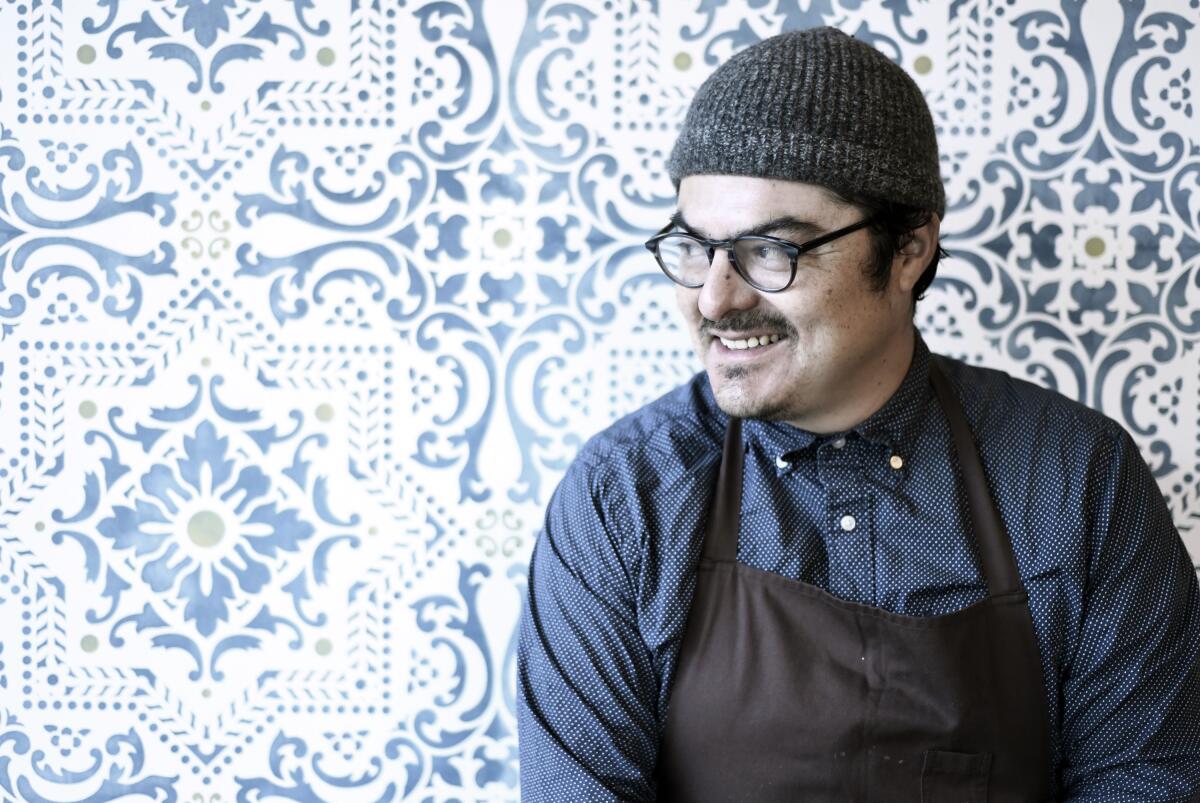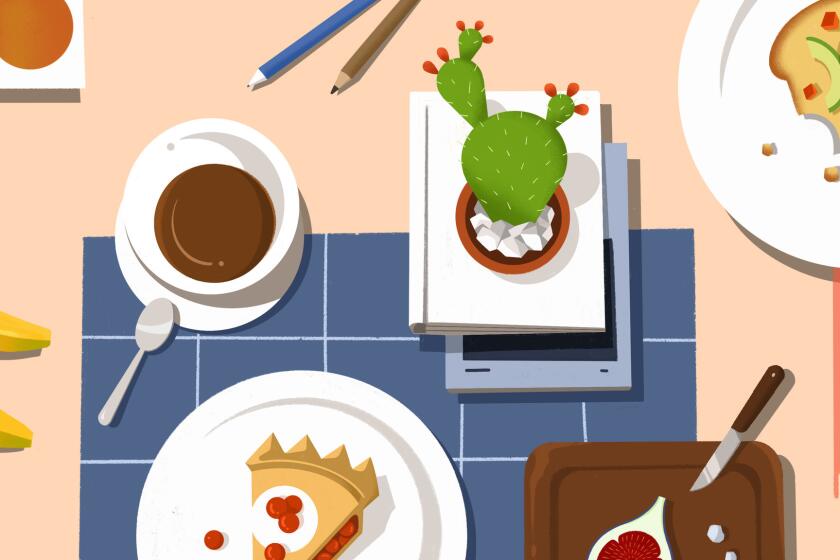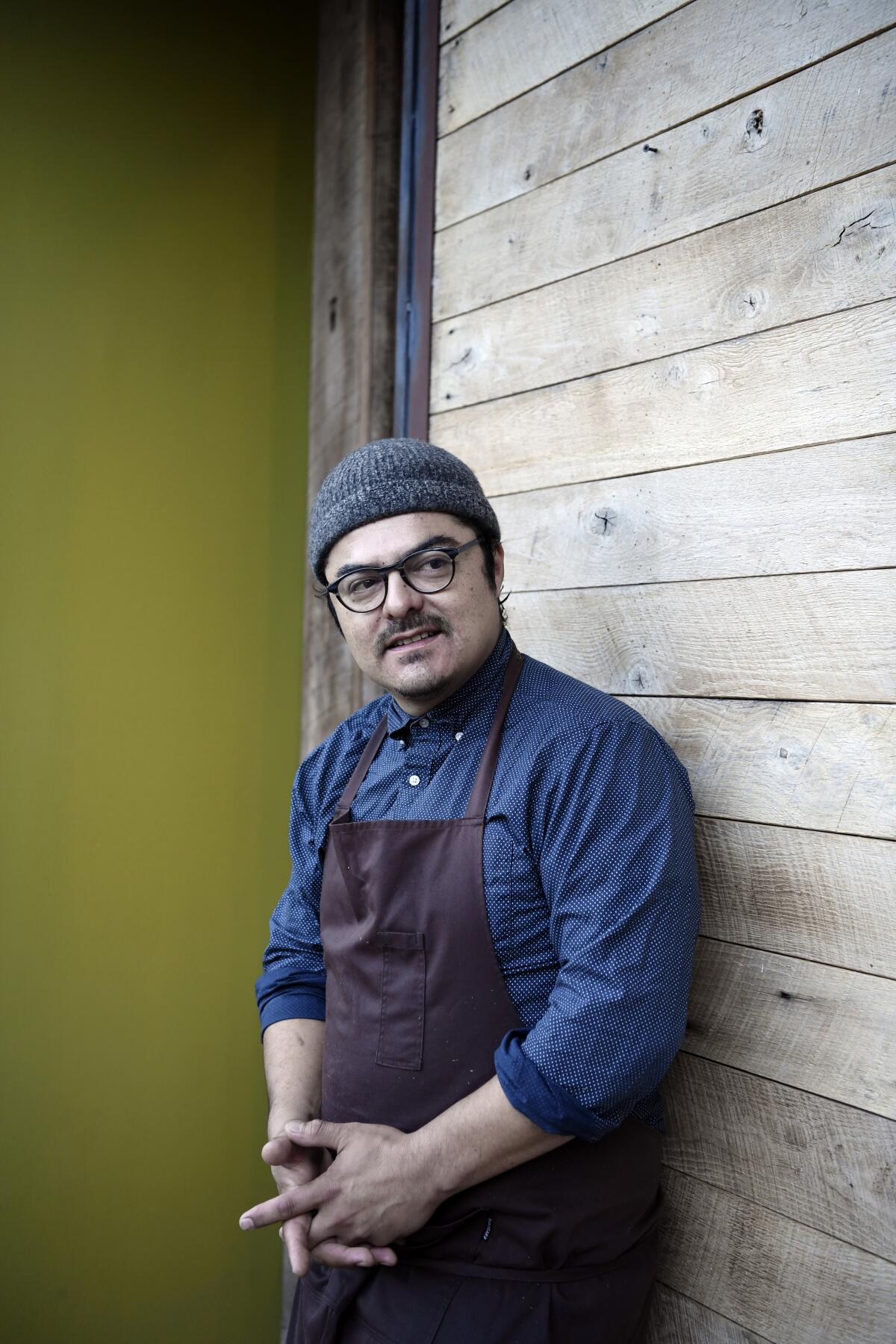Taco María’s Carlos Salgado on becoming a chef

- Share via
Carlos Salgado, the chef of Taco María in Costa Mesa, was one of the speakers at Mesamérica L.A., a night of talks and tacos that was presented as part of the L.A. Times Food Bowl this May. This is a lightly edited version of the talk he gave that night.
My mother and father recently sold their restaurant, which they operated for over 30 years.
They’ve been operating restaurants together for even longer than that. Being first-generation immigrants, not speaking the language, becoming a part of this Southern California community: I imagine it was much more difficult for them than it is for Mexicans now. As I mature and as I have become a parent myself, I’m beginning to understand exactly the difficulty that new immigrants from Mexico faced in this state and in this country.

Sign up for the Tasting Notes newsletter
A moment of vulnerability that I’ll share with you: When I was growing up in their restaurant as a second-generation child of immigrants, I was led to believe that being Mexican was not a good thing.
I grew up as a child of immigrants in largely Anglo communities. Because I had the burden of being smart, I went to school in a very upper-middle-class neighborhood. I was one of a few people of color in this school. I was indoctrinated into the belief that being an immigrant and being Mexican was a point of shame. I came to genuinely believe that my parents’ culture was lesser, that the work they did was mundane and unimportant. And I genuinely believed that I wanted to be like the kids I went to school with.
My friends would come over to my house after school; it’d be a hot summer day, and the house would be humid and smell of beans. My friends would turn up their noses.
It wasn’t until many years later, after using my useless intelligence to pursue a career in technology, that I realized, in fact, I wanted to be Mexican. I realized that the culture that I had been raised in had no flavor.
In wanting to discover myself and my own culture, I had to come back to my parents. I had to get to know who they were and what their stories were. I had to speak to my grandparents back in Mexico, which thankfully I had time to do before they left us. I asked for recipes; I traveled as much as I could. I had to discover myself; I had to discover where I came from.

At some point, I realized that everything I had learned and studied throughout my early career could fit on a Zip disk. Twenty years of work were completely immaterial, amounting to nothing, and did not move anyone to any great emotion. Those years did not facilitate or engender conversation or relationships, love or friendship. I realized that the education I was gifted by my parents should be employed to a different goal.
That’s when I discovered that cooking was inside of me. In our family, you’re a cook — there’s no question. In some families, there’s no concept of being a musician because everyone is inherently a musician. That was very much the same in my family.
At some point, I realized I had this arrogant idea that by virtue of being educated in the United States, by being well read, intelligent, good at math, physics and chemistry, that I was somehow different. Being humbled by the realization that my previous work was cold, dispassionate, was reason enough for me to leave college and begin cooking. And in that process, I learned about myself and more about the natural world, about civil society and moral man. I learned more than I ever would have in school.
For me, Taco María is an individual ethnographic journey, a way in which I can understand myself. It’s a way to develop the confidence to assert my identity and my personality in this place, which, while being inherently Mexican, is somehow not entirely welcoming of Mexicanism. Despite being naturally born in the United States and identifying early on as an American, I never understood myself, my place, my purpose as much as when I started to look back across the border and back in time and back through my family tree.

Carlos Salgado’s Costa Mesa restaurant, Taco Maria, is this year’s Restaurant of the Year.
I realized that all of the intelligence and erudition and knowledge I had gained up until then would serve me well in cooking, in the study of food. A few years ago, when I opened the restaurant, I considered myself a cook. I no longer really think of myself that way. I aspire to be more of a writer, more of a designer. Instead of working with words or with images, I try to work with materials and use them as phrases or verses that — on the plate — carry more meaning than I could portray through words.
Within my work at Taco María, as I mature, I begin to take this role of trying to create opportunities for young Mexican-American kids, children of immigrants, people of complex identities to express themselves through food; to think academically, scientifically, sociologically, politically about the work they do; to think about where food comes from, think about where their stories come from, and express those stories through their cuisine.
I want them to do this so that we might generate more culture founded on the richness of those who immigrated into this country. So that we might create a new culture, syncretic and unique and exceptional in a much different way, rather than accepting that the economy of fast-food restaurants and all of our national foodways define food in the United States.
If we can take ownership of our place and our soil, if we can come to own and shepherd the seeds of our culture, the foods of our culture, if we can use those foods to speak confidently about ourselves and where we come from, then maybe we can create and become comfortable within our own culture in a place that seems to need one.
More to Read
Eat your way across L.A.
Get our weekly Tasting Notes newsletter for reviews, news and more.
You may occasionally receive promotional content from the Los Angeles Times.










